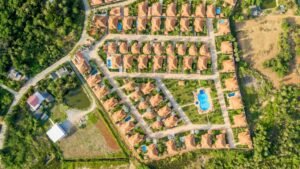
Thailand Real Estate 2025: Key Trends for Smart Buyers
Overview: Thailand Real Estate Market 2025
The Thailand Real Estate Market 2025 presents a mixed picture. While certain segments such as luxury villas and coastal retirement properties retain strong appeal, the overall market remains cautious. Developers are scaling back new launches, tourism is underperforming compared to forecasts, and oversupply in the condominium sector continues to weigh on prices.
For smart buyers, this means opportunities exist — but only with careful due diligence and strategic planning.
Economic Context and Market Conditions
-
Tourism weaker than forecast: International arrivals in 2025 have trailed expectations, softening demand in holiday-driven markets like Phuket and Pattaya.
-
Condo oversupply in Bangkok: Launches of new condominiums have dropped sharply, as developers focus on clearing unsold inventory.
-
Construction costs remain high: Elevated material and labor costs put pressure on developers, contributing to delays and selective project launches.
-
Policy rate cuts: The Bank of Thailand reduced interest rates in 2025 to support the economy, easing mortgage burdens but signaling softer domestic demand.
👉 This environment favors disciplined buyers who negotiate aggressively, focus on high-demand areas, and verify real rental yields before investing.
Key Market Trends Buyers Must Watch
1. Bangkok Condominiums: Proceed with Caution
Bangkok remains Thailand’s largest property market, but oversupply is a real risk. The luxury downtown segment has limited quality projects with long-term appeal, while mid-market condos face price stagnation due to high unsold stock.
2. Coastal Markets: Hua Hin, Phuket, Pattaya
-
Hua Hin: More resilient, attracting retirees and lifestyle buyers with steady local demand.
-
Phuket & Pattaya: Dependent on tourism recovery, which remains below expectations, increasing rental income uncertainty.
👉 Explore our curated Hua Hin property listings for tailored investment opportunities.
3. Foreign Investment Rules
Foreigners still face restrictions on land ownership, with condominiums (up to 49% foreign quota) and long-term leases remaining the primary options. Legal guidance is essential.
4. Lifestyle Investments & Smart Homes
Buyers are increasingly seeking eco-friendly, smart properties. This trend is strong in the luxury villa segment, especially in Hua Hin and Koh Samui.
Step-by-Step Checklist for Buyers in 2025
Buying property in Thailand can be rewarding, but oversight can be costly. Follow this checklist to protect your investment:
Step 1: Define Your Purpose
-
Are you buying for retirement, lifestyle, rental yield, or long-term appreciation?
-
Your strategy determines the right location and property type.
Step 2: Research the Local Market
-
Check recent comparable sales and rental yields.
-
Identify unsold stock levels in your chosen area.
Step 3: Verify Legal Ownership
-
Condos: Confirm the foreign ownership quota isn’t already filled.
-
Houses/villas: Use long-term lease structures or Thai company setups (with legal advice).
Step 4: Secure Financing
-
Compare mortgage offers from Thai banks.
-
Account for exchange rate risks if funding from abroad.
Step 5: Inspect the Property
-
Never buy sight-unseen.
-
Review building quality, maintenance fees, and occupancy rates.
Step 6: Hire Professionals
-
Engage a licensed lawyer for contract review.
-
Use a reputable agent familiar with the local market (like OneStop Hua Hin).
Step 7: Plan for Ongoing Costs
-
Consider taxes, insurance, maintenance, and management fees.
-
Stress-test rental yields with conservative occupancy assumptions.
Hua Hin Spotlight: A Safer Bet in 2025?
Compared to Bangkok and Pattaya, Hua Hin offers:
-
Strong domestic demand (Bangkok residents seeking second homes).
-
A stable expat and retiree community.
-
Lower risk of oversupply compared to the capital.
👉 Learn more about our Hua Hin real estate services and why this market continues to attract long-term buyers.
Challenges Buyers Should Consider
-
Oversupply of condos in Bangkok.
-
Tourism volatility affecting rental yields in Phuket/Pattaya.
-
High construction costs delaying new projects.
-
Complex foreign ownership rules requiring legal safeguards.
Future Outlook: Beyond 2025
The Thai real estate market will remain a buyer’s market in many segments, particularly mid-market condos. However, long-term fundamentals — retirement demand, lifestyle appeal, and continued infrastructure development — support selective opportunities.
For investors, the key is prudence, patience, and professional guidance.

FAQs — Thailand Real Estate Market 2025
1. Is Thailand property a good investment in 2025?
Yes, but selectively. Avoid oversupplied condo markets; focus on lifestyle-driven and well-located properties.
2. Can foreigners buy land in Thailand?
No, foreigners cannot own land directly. Options include condominium purchases, long-term leases, or company structures.
3. Which cities are best to invest in?
Hua Hin, Bangkok (prime areas only), Chiang Mai, and select parts of Phuket.
4. What risks should buyers be aware of?
Oversupply, weak rental yields in tourist areas, and currency fluctuations.
5. How can I finance a property in Thailand?
Foreign buyers can apply for mortgages from certain Thai banks, but requirements are strict.
6. Is Hua Hin safer than other markets in 2025?
Yes, Hua Hin is considered more stable, especially for retirees and second-home buyers.
Conclusion: Smart Moves in 2025
The Thailand Real Estate Market 2025 is not a boom market — but it offers value for cautious buyers who focus on the right segments. Hua Hin, luxury villas, and select Bangkok projects remain attractive if approached with careful due diligence.
👉 Ready to take the next step? Contact OneStop Hua Hin for expert advice, curated listings, and professional support to navigate Thailand’s evolving property market.
For additional global comparisons, explore Global Property Guide.

